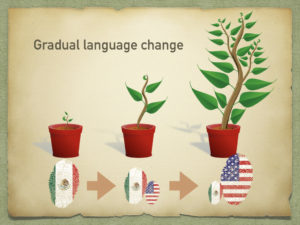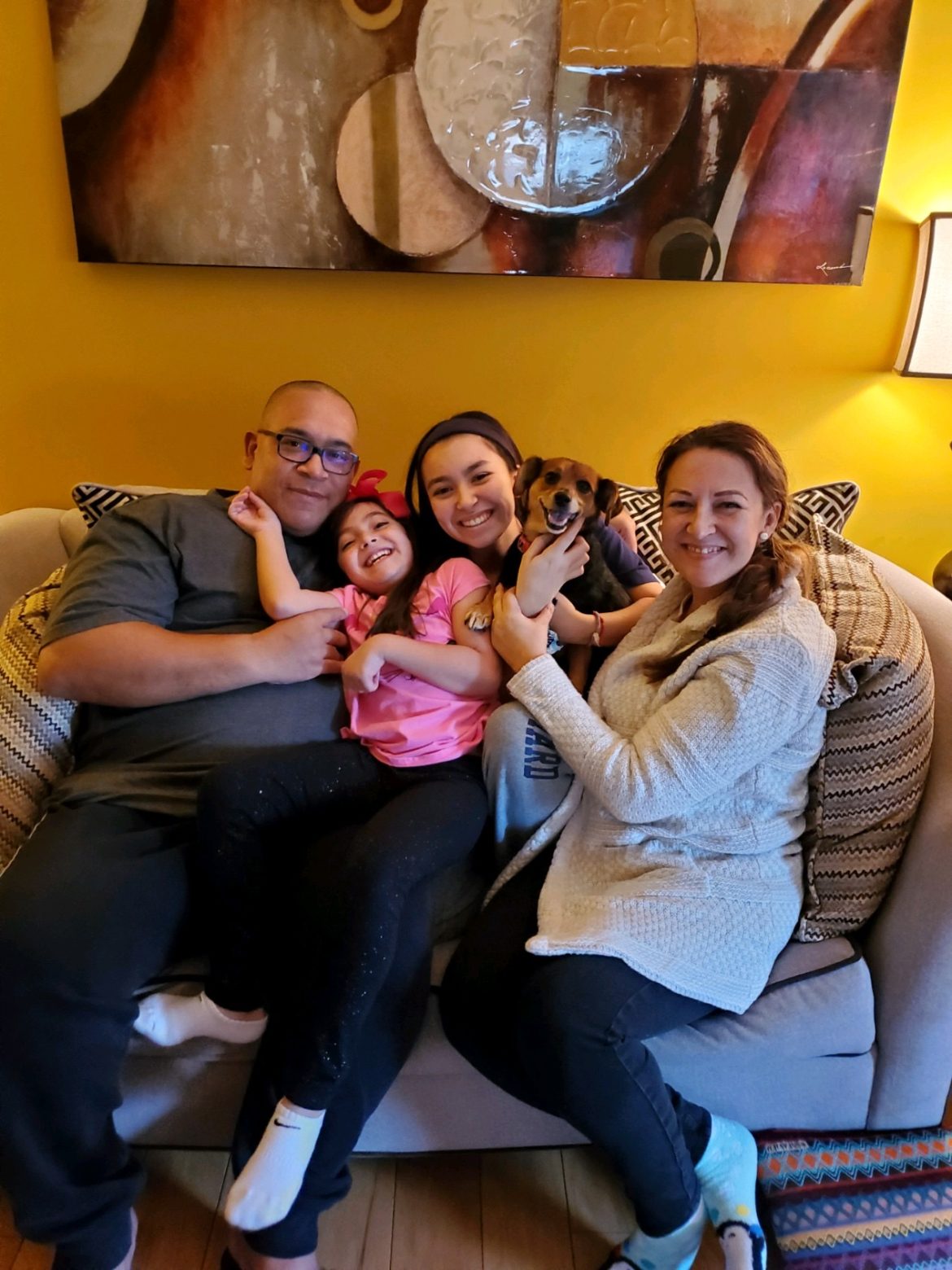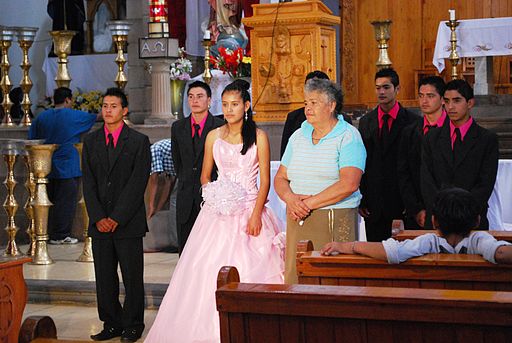With a PhD in Education, Alexis Lopez has been working in bilingual education and assessment in the U.S. K-12 system. He is also a dad to two bilingual girls: a 7 and a 17 year old. Although dealing with bilingualism professionally, he shared how dominant the English language can get in countries like the United States and how challenging it can be to keep up the minority language within the family.
 Veronika: Hi Alexis! Thanks for taking the time!
Veronika: Hi Alexis! Thanks for taking the time!
Alexis: No problem.
Veronika: Okay, my first question or first questions for you are: Who is part of your family? And who speaks what language to whom?
Getting married: 1+1= 4
Alexis: I got married 4 years ago. My wife already had 2 girls. She is from Mexico. When they came here to the United States, Valentina was 13 and Violeta was 3. Violeta at that time only spoke Spanish. So, we spoke Spanish to her, and then Valentina would codeswitch a lot. But as time progressed, we moved more to English. I think sometimes within the house, we code-mix a lot. But generally, it would be Yolanda, my wife, who speaks more Spanish. Overall, I think we speak more English.
Veronika: Okay. Do both children still speak Spanish fluently now?
Starting English as a toddler in the United States
Alexis: Valentina, she’s fully bilingual and biliterate. And with Violeta, we had this process where at the beginning, she only spoke Spanish. I don’t think I remember her saying anything in English for 5 or 6 months; and then we noticed that she started speaking English. She had memorized a lot of sentences and chunks; and she started using them little by little. Plus, she gradually began to switch from watching movies and TV series in Spanish to watching them in English. Then, when she started to go to daycare, and began the pre-school, that’s when her English picked up.
 I think 2 years ago, we were really scared because she was refusing to speak Spanish. She wanted everything in English. But we were fortunate to go back to Mexico for two weeks for Valentina’s Quinceañera. There she had an opportunity to talk to a lot of people in Spanish, including her family and friends. So her Spanish got a small boost again and we’ve been able to maintain it for the past 2 years.
I think 2 years ago, we were really scared because she was refusing to speak Spanish. She wanted everything in English. But we were fortunate to go back to Mexico for two weeks for Valentina’s Quinceañera. There she had an opportunity to talk to a lot of people in Spanish, including her family and friends. So her Spanish got a small boost again and we’ve been able to maintain it for the past 2 years.
But she speaks Spanish with an accent. I also think she understands more than she can speak. But her preference or dominant language is English.
Veronika: How old is Violeta now?
Alexis: She’s now 7.
Quinceañeras and vacations: Opportunities to practice Spanish
Veronika: Since that the trip to Valentina’s Quinceañera, do you make more of a conscious effort to keep the Spanish up for her in your house?
Alexis: Yeah. So, we try to speak more Spanish to her. But like I said, her preference is English. We try to watch shows in Spanish or read books to her in Spanish. But if it is up to her, she’ll just switch to English. But then she regularly speaks with her grandmother in Mexico. They speak in Spanish. And some other members of my family also speak only Spanish to her.
But like I said, the majority is English. And, it’s also hard… we try to speak to her in Spanish. We start the conversation in Spanish, but pretty soon, we switch to English.
Veronika: Yes, it’s a constant grind and push for the minority language. Is Violeta going to a bilingual school in the U.S.?
It’s difficult—English is everywhere!
Alexis: No. I think that’s one of the biggest challenges because it is all English and it started with the daycare center. Then she went to Kindergarten. The same thing—all English. I don’t think there’s anybody in her class who speaks Spanish. So, yeah, I guess her environment is mostly English as well.
Veronika: So Spanish is mostly spoken at home then. What do the sisters speak to one another?
 Alexis: Mostly English. Sometimes Spanish. But I’d say most of their conversations are in English.
Alexis: Mostly English. Sometimes Spanish. But I’d say most of their conversations are in English.
Veronika: Okay. So, you said you use films and books to keep the Spanish alive, and communication with grandparents. Anything that you’ve found works particularly well against that strong pull of English?
Alexis: No, it’s kind of difficult. I guess our initial idea was that I’d do the English part and my wife would do the Spanish part. But we soon realized that it was mostly100% English and I thought we would go back to normal. We can go back to Mexico. I think that would help. Last year, we went to Colombia—my home country—for two weeks and it was also an opportunity for her to practice her Spanish. Well, she has to because most people speak only Spanish there. But if she realized that someone speaks or understands English she would switch.
How to go about developing reading and writing skills in Spanish?
The other thing is that school is in English. Right now, she’s developing literacy in English first. Our plan down the road, maybe in 2 or 3 years, is at least a summer school or something in Mexico where she starts developing her literacy skills in Spanish. If not, we’ll do it here. But we’re waiting for her English literacy to get stronger. So, she’s reading grade one level, and like I said, she also reads books in Spanish sometimes.  But it’s kinda difficult because her engagement with Spanish is minimal. So, we tried as much as possible, but I think it’s more natural for us to do it in English for some reason. Even if we start in Spanish, we end up speaking English.
But it’s kinda difficult because her engagement with Spanish is minimal. So, we tried as much as possible, but I think it’s more natural for us to do it in English for some reason. Even if we start in Spanish, we end up speaking English.
Veronika: What about your older daughter? Have you started that bi-literacy track already?
Alexis: No. So, when she came here, she was fully bilingual. She had completed her 7th grade. Actually, last year, she was in grade 11 and she had an AP Spanish class. She took the test and had a perfect score. That’s a completely different situation. With Violeta, it’s more complicated.
Plans change…and you won’t even notice
 And so, even though we had an initial plan; we had to change it a little bit. We wanted her to develop her literacy in both English and Spanish simultaneously but that was too difficult. So, we decided to wait, focus on English first, and then work on the literacy in Spanish.
And so, even though we had an initial plan; we had to change it a little bit. We wanted her to develop her literacy in both English and Spanish simultaneously but that was too difficult. So, we decided to wait, focus on English first, and then work on the literacy in Spanish.
Veronika: Do you have a game plan on how you want to promote literacy in Spanish at home? Would you have writing sessions at home at dedicated times?
Alexis: That’s the plan, but we’re not sure if that’s going to work and that we are going to have enough time because, by then, she’s going to have more homework and so forth. But like I said, our plan is a summer school or something in Mexico. And then, after she does that, then we have to reinforce it here and continue practicing. But we’ll see if that works out down the road.
Veronika: Yeah. That’s interesting… Ella is going to a German school on Saturdays. So, I’m hoping that those classes will eventually help develop her reading and writing skills in German and that she remains to be friends with other German-English bilinguals to keep her motivation up. Eventually, when she enters school, it’s going to be more of a push to keep German a vital part of her life.
When you are the only one who speaks the minority language
Alexis: Yeah. All of Violeta’s friends are English speaking… About 4 years ago, we found her a friend, a little girl who spoke Spanish. Violeta and the girl used to play together, but then they moved to New York City. Almost everybody else here speaks English. So, it’s up to us to use Spanish more regularly and rigorously.
Veronika: Are you part of a Spanish-speaking community where you live? Or do you have a circle of friends her that speaks Spanish?
Alexis: Not at all—everybody speaks English. Neighbors, people from school. The girls’ have extra-curricular activities like gymnastics and dancing, but there too… everybody speaks English. So it’s kind of difficult.
Veronika: I can imagine that. It is difficult to keep pushing the minority language when it’s just you.
 Alexis: Yeah, my brother had a very similar thing happening to him. He lives in Canada. His daughter, once she started school, her Spanish almost disappeared. It’s like 100% English. But like I said, we’ve been fortunate that we had the privilege to go back home and the opportunity to re-enforce Spanish. Even though the girls are not comfortable, but at least they’re practicing in an authentic environment and so forth. But when Violeta knows that she can speak to you in English and you’ll understand…
Alexis: Yeah, my brother had a very similar thing happening to him. He lives in Canada. His daughter, once she started school, her Spanish almost disappeared. It’s like 100% English. But like I said, we’ve been fortunate that we had the privilege to go back home and the opportunity to re-enforce Spanish. Even though the girls are not comfortable, but at least they’re practicing in an authentic environment and so forth. But when Violeta knows that she can speak to you in English and you’ll understand…
Veronika : … she takes the easy way out.
Maintaining connections with the Spanish speaking families in the home countries
Alexis: Yes! That’s why we try a lot of communication with family back in Colombia and I think that’s very important. Our main goal, is that the girls are able to continue the relationship with extended family. So, language is a big issue because the majority there just speaks Spanish. The other issue is the culture. That’s why we want Violeta to be not only bilingual but also biliterate. We want her to be able to read and access the cultural information in Spanish. That will be very useful for her.
Veronika: Right. Are there exchange programs with Colombia? Like school exchanges?
Alexis: Yes, there are! Definitely with Mexico. Yeah, hopefully she can go back and do something—and keep that connection. For us, that’s very important.
Veronika: Yeah, I hear you. We Facetime at least 3 or 4 times a week with my mother and my sister in Germany.
Alexis: That’s helpful.
 A piece of advice: Focus on the minority language at home
A piece of advice: Focus on the minority language at home
Veronika: Yeah, that helps a lot! Okay, last question: is there any advice that you would give to parents who want to raise their children with two or more languages at the same time?
Alexis: Yeah. My brother lives in Canada. He has 2 girls. And they also went with the model. He was going to speak in English and their mother was going to speak in Spanish. And we tried to do the same thing. So, my suggestion if you live in an English speaking country like the United States and if your children are going to a school that’s English only, I think my advice is to focus strongly on Spanish or the minority language at home. When they start school, the immersion in English is way too much and too strong. Violeta almost lost all her Spanish and it went so fast. We barely realized that all of a sudden she was having difficulties finding words in Spanish, putting the words together etc. She even struggled understanding Spanish! But, like I said, once we traveled to Mexico, she had the opportunity to practice. That helped. And last year, we went to Colombia. So, yeah, my advice is to focus on the minority language. Once they start school, it’s mostly English there so they will develop English regardless.
Veronika: All right! Thank you so much.
Alexis: All right! You’re welcome.



2 comments
I’m the mother of a two year old and speak Russian with her exclusively while her dad is native English speaker. He tries to understand some Russian in the home but even now I feel the deluge of English everywhere we go, as this interview describes. It’s so early in the game for her language skills and she is learning Russian, but I very much worry it will disappear rapidly once she starts school or even earlier. From your experience and doing interviews for this site, what has worked to maintain a minority language.
Hi Sasha, I’m in the same boat with German as our minority language. The advice I would give is: keep at it. Expose her to Russian as much as you can, be a strong role model for Russian (e.g.,set the rule that you speak only Russian and then stick to it), create a need for her to use Russian regularly (e.g., are there grandparents, friends in Russia who don’t speak English so she needs to use Russian etc.), and try to establish a positive relationship for her with the Russian language so she ‘wants’ to use it. In the end, raising children with multiple languages is as much helping them build an identity in their minority language(s) as it is working on the language(s) themselves.
If you look under the category “Language tips” on my blog you find some more detailed ideas.
Good luck and feel free to reach out at any time! You are going the extra mile and that deserves a lot of credit!! 🙂